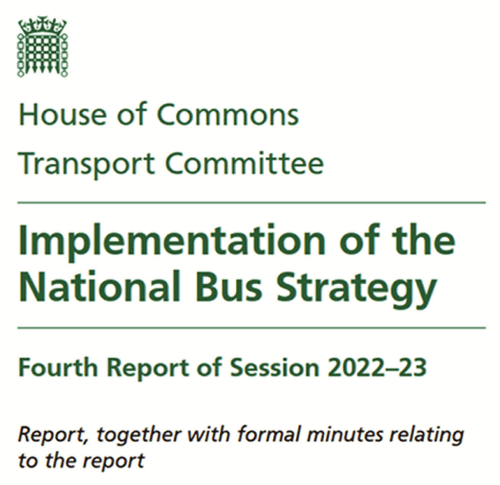
There needs to be continued focus on improving services says the Transport Select Committee if the Government is to make good on its Bus Strategy promises
Chair of the Transport Committee Iain Stewart MP has urged the Government to keep its focus on improving bus services throughout the country. He welcomed the recent announcement of additional funding through to 2025 and is now calling on the Department for Transport (DfT) to continue working closely with England’s councils to upgrade local bus services. His comments coincided with the publication of the DfT’s response to the Committees report that scrutinised the National Bus Strategy.
The Strategy was published in March 2021 with the aim of both improving services and encouraging more people to stop using their cars and go back to using buses, following the slump seen during the pandemic, exacerbated by a decline in service quality, to help cut congestion and reduce pollution.
Mr Stewart said: “Our report warned that if the Government did not loosen the purse strings and give at least some BSIP funding to all areas of the country, a two-tier system could emerge, with some areas having notably worse services than others in neighbouring towns and cities. Although the Government did not explicitly acknowledge this warning, we are pleased it appears to have taken the idea on board, and that the latest round of funding saw those councils that missed out last time getting some of the pie.
“We still believe the Government should find more funding beyond 2025 to truly transform local services in the way its original Strategy envisaged. We look forward to hearing the outcome of the evaluation of BSIP funding that DfT now plans to conduct.
“Elsewhere ministers deserve credit for sticking with the £2 fare cap. Ridership has been gradually recovering partially thanks to this, which is exactly what we need to get emissions down and quality bus services on a sustainable footing. But we need ministers to keep this up and realise this really is money well spent.
“We can only hope the DfT has a breakthrough with its efforts to get 4,000 zero-emission buses on the road. It boasts that 3,400 zero-emission buses have been funded since February 2020, but what that actually means in terms of how long before they’ll be on the road feels very unclear.”
BSIP funding
Bus Service Improvement Plans (BSIPs) were the Government’s challenge to councils – to partner with local bus firms and come up with detailed, costed plans of how they could improve services in their patches by investing in upgrades like new priority bus routes, cashless payments and smart ticketing systems.
County and city councils across the country submitted bids for funding from the £1.1bn pot, but 60% found their requests were rejected, and all received less than they asked for, leaving councils and operators disappointed.
In its report, the cross-party Committee urged the DfT to make more funding available, warning that otherwise the ambitions in its National Bus Strategy would not be achieved, and that areas which received funding would be able to improve services, while those that did not would continue to see services decline. The DfT recently announced a second smaller round of BSIP funding totalling £160m, which ensured all councils had received some funding. However, its response to the report makes no commitments to the ‘significant further funding’ recommended by the Committee.
4,000 bus target
The response did not directly address MPs’ scepticism that DfT will hit its target of 4,000 zero-emission buses (ZEBs) by the end of the parliament via its Zero Emission Bus Regional Areas scheme. The Department said approximately 3,400 ZEBs have been funded already, but in response to a recent written question it told the House it had not estimated what the average length time is between funding being allocated for ZEBs and them becoming operational.
The Committee’s report said DfT should produce a clear, staged plan for the full transition to ZEBs, in tandem with the delayed response to its consultation on ending the sale of non-ZEBs, which should include a clear long-term funding plan focused on ‘difficult to decarbonise rural routes’ and supporting the installation of costly new charging infrastructure.
The Government reiterated its commitment to setting an end date for the sale of new non-zero emission buses ‘shortly’ and said it would publish a plan ‘in due course’ for phasing out non-electric buses entirely.
 BSOG and necessary services
BSOG and necessary services
The Committee said the DfT must consult as soon as possible on reforming the Bus Service Operators Grant, which does not currently incentivise operators to transition to zero-emission buses. The Government has accepted that the current funding formula is ‘outdated’ and committed to launching a consultation later this year. The DfT will also explore mechanisms by which BSOG could support ZEB uptake.
In the National Bus Strategy, the DfT said it would issue new guidance on socially and economically necessary services and consider introducing a statutory requirement on councils to provide them. The report expressed disappointment at the lack of progress two years later and urged the minister to take action. The response said new guidance will be published during this parliament, and will consider statutorily requiring socially and economically necessary bus services if the BSIP process does not result in improvements.
Municipals, franchises and partnerships
The DfT’s Stratagy said the ban on councils having in-house municipal bus companies was ‘ripe for review’ and that it would issue new guidance on bus franchising – the model used by TfL and only available to metro mayors and councils with ‘devolution deals’. MPs said DfT needs to make progress with this as two years had now passed. The response said new franchising guidance will be issued “as soon as possible”, and that a call for evidence on allowing new municipal bus companies will be launched ‘during this parliament’.
The National Bus Strategy pushed for local authorities to instead adopt statutory ‘Enhanced Partnerships’ (EPs) with bus operators. The Committee said EPs were ‘largely untested’, and that ministers had ‘made a big bet’ on them being the best model. The report said DfT must carefully monitor how well EPs are working and ensure appropriate contingencies are in place.
The DfT’s response said councils are obliged to carry out such monitoring, but that it will provide support for EPs via its new Bus Centre of Excellence. It also highlighted positive feedback from councils using EPs, while acknowledging they are a ‘new and untested mechanism’.

